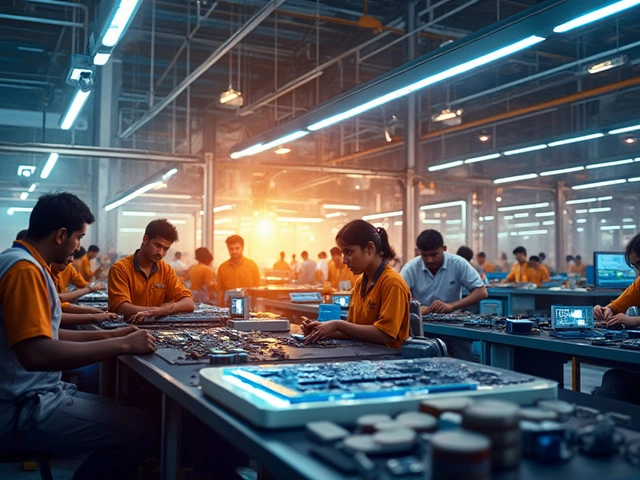As the world becomes increasingly reliant on technology, the companies that supply the essential components for these devices have gained monumental importance. One such pivotal player is Taiwan Semiconductor Manufacturing Company, or TSMC. The firm has become a cornerstone in the semiconductor industry, providing chips that power everything from smartphones to advanced computational systems.
In this article, let's unravel who the major investors of TSMC are and understand how these stakes affect the burgeoning electronics manufacturing sector in India. With this knowledge, we can gain insights into the intricate web of global technology investments and their long-term implications.
- Overview of TSMC's Role in the Semiconductor Industry
- Key Investors and Shareholders of TSMC
- TSMC's Impact on India's Electronics Manufacturing Growth
- Future Prospects and Investment Trends in the Semiconductor Sector
Overview of TSMC's Role in the Semiconductor Industry
Taiwan Semiconductor Manufacturing Company, widely known as TSMC, stands as a titan in the semiconductor industry. Founded in 1987 in Hsinchu, Taiwan, this powerhouse paved the road for the pure-play foundry model, which focuses solely on manufacturing semiconductors designed by other firms. In a world increasingly driven by technology, TSMC's influence stretches far beyond its geographic origins, acting as the backbone for the digital evolution of countless industries. It's no exaggeration to say that without TSMC, many of the world's tech giants would struggle to maintain their momentum, as TSMC manufactures the highly complex and intricate chips found in every corner of modern life — from smartphones, tablets, and laptops to high-performance servers and vehicles.
By 2023, TSMC was responsible for producing over 50% of the world's semiconductor output, dramatically demonstrating its unparalleled capacity and capability. The company boasts an impressive clientele list that includes mainstream tech giants like Apple, Qualcomm, and Nvidia. Its innovative pursuit doesn't rest on laurels. With an eye on the future, TSMC continues to invest heavily in research and development, to push the boundaries of what these semiconductors can achieve. As technology companies increasingly demand chips that are not just faster, but also more efficient and smaller, TSMC remains at the forefront of meeting these demands. This relentless pursuit of innovation positions TSMC as a vital component in the global technology supply chain.
The importance of TSMC's role was further highlighted during the global chip shortage, which underscored the critical need for semiconductors across various industries. This crisis brought to light the incredible reliance on TSMC's production capabilities to keep technology markets afloat globally. According to a Bloomberg report, "TSMC is not just a participant in the global economy; it’s an enabler of it," marking how deeply entwined TSMC is in international economic structures. While this has propelled TSMC to a revered status, it has also placed it under tremendous pressure to sustain and ramp up production to meet escalating global demands.
The strategic importance of TSMC extends into geopolitical realms, as nations leverage semiconductor production capabilities to both secure supply chains and stimulate economic growth. The persistent technological race between countries has amplified focus on TSMC's operations and its pivotal position. A TSMC investor sees more than just a financial asset; they eye the broader impact of technological infrastructure and its potential to revolutionize markets globally. Understanding TSMC's central role thus becomes essential for anyone seeking insights into the current state and future trajectory of the semiconductor industry.

Key Investors and Shareholders of TSMC
Investing in the complexity and innovation of the semiconductor industry might seem like a labyrinth for many. Yet, some have adeptly navigated this intricate terrain, putting their stakes in Taiwan Semiconductor Manufacturing Company (TSMC), one of the titans of chip manufacturing. As of the latest figures, institutions, corporations, and individuals alike form a robust tapestry of investors who collectively shape the financial backbone of TSMC. A preeminent name that strikes in the circle is the National Development Fund, managed by the Executive Yuan of Taiwan. This governmental body plays a strategic role in holding shares to ensure the nation's economic stability and strengthen its tech industry prowess.
Another powerhouse contributing to TSMC's shareholder ecosystem is international investment firms. Among these, Capital Research and Management Co. emerges prominently. Known for its deep pockets, this U.S.-based investment firm has consistently reported substantial stakes in TSMC, reflecting its confidence in the company's growth trajectory in semiconductor manufacturing. Moreover, tech-centric investors like BlackRock, one of the planet's largest asset managers, also hold significant portions. On the individual end of the spectrum, TSMC's founder, Morris Chang, has a noteworthy share. His enduring influence reinforces the blend of visionary leadership and sound investments.
TSMC investors not only bank on the company's current production capabilities but are also betting on its future potentials, such as its initiatives in 3nm process technology, which promises lower power consumption and higher speeds. An interesting aspect of the investor landscape is the involvement of tech behemoths like Apple. While Apple does not feature in the typical shareholder registry due to confidentiality around contract-based relationships, the depth of collaboration with TSMC essentially makes them a 'partner investor' in spirit and mutual interest.
Over recent years, the geographic distribution of these investors has reflected a fascinating shift. With the rise of electronics manufacturing in India, there's been an recalibration towards Indian investors seeking to engage with TSMC as a part of India’s semiconductor ambitions. While government-backed entities lead the charge domestically, there is attention from burgeoning private firms eager to tap into the technical know-how and partnership potential that TSMC offers. This economic interaction is strengthened by the bilateral tech dialogues that both nations engage in.
"Our strategic investments in semiconductor solutions are poised at delivering unrivaled value in global tech ecosystems," noted a spokesperson for Capital Research and Management Co., shedding light on the broader investor sentiment around TSMC.
Peering into the future, industry observers eye trends in sustainable investments. TSMC has been actively seeking investors with a keen interest in sustainable and eco-friendly technologies, aligning themselves with both national and global environmental goals. With these dynamic elements at play, understanding the investor landscape of TSMC reveals not only financial strategies but a blueprint of technological and nationalistic aspirations—a story of innovation, collaboration, and foresight in the world of semiconductors.

TSMC's Impact on India's Electronics Manufacturing Growth
The surge of the electronics manufacturing industry in India is as vibrant as it is promising, and TSMC plays a significant role in this emerging narrative. With the global demand for semiconductors soaring, India has positioned itself as a critical player in the arena, striving to attract investments and catalyze transformation through robust policy initiatives. TSMC, renowned as the world's largest contract chipmaker, has indirectly fueled this momentum through its investments and collaborations, inspiring a wave of innovation across the subcontinent. This influence is evident in the burgeoning ecosystems around the major tech hubs in India, where companies are leveraging TSMC's technological advancements to enhance their product offerings.
A noteworthy aspect of TSMC's indirect contribution is its impact on skill enhancement and employment opportunities in India. As reported, the influx of TSMC's practices has compelled Indian manufacturers to elevate their benchmarks to match global standards. This symbiotic relationship not only boosts local companies' technological capabilities but also necessitates a skilled workforce adept in semiconductor technologies. The ripple effect here is monumental, fostering education and training programs that further solidify India's standing in the semiconductor hierarchy.
TSMC's role in India's semiconductor journey cannot be overstated. Yet, one might wonder, how does a company like TSMC enhance India's global competitiveness in this field? The answer lies in the strategic partnerships and collaborations that TSMC engages in with Indian firms. Electronics manufacturing has benefited from TSMC's cutting-edge technology, which streamlines production processes and enhances product quality. This connection is crucial, developing a competitive edge that positions India on the global map of electronics manufacturing hubs. For instance, companies aligned with TSMC's supply chain leverage these advancements to produce quicker, more efficient, and cost-effective products, establishing a niche in the fast-paced tech world.
"India's semiconductor industry is poised for growth, and it's the synergy between existing global leaders and budding local talent that will drive this transformation." —Quotes from industry experts often echo sentiments shared by major players like TSMC.
In building a sustainable future for electronics manufacturing in India, strategic shifts such as increased investment from TSMC stakeholders further bolster this trajectory. These investors bring not only capital but also insights and industry connections that are invaluable to the growth of India's burgeoning tech industry. This framework of collaboration and skill-sharing is essential to harness the full potential of TSMC's influence on India's electronics manufacturing sector.
Empowering Local Innovation
In the backdrop of TSMC's global influence, one must acknowledge how this impacts innovation locally. Indian companies have begun to invest heavily in research and development, aiming to harness the prowess that TSMC has demonstrated. This investment is not limited to financial resources but extends to acquiring talent and creating incubation hubs to build products that cater to both local and international markets. The increase in patent applications within India in the electronics sector is a testament to the innovative spirit that TSMC's presence indirectly encourages. As the nation embraces policies to promote semiconductor manufacturing, the ecosystem fostered by such global giants cannot be underestimated; instead, it sets the groundwork for India to evolve from a manufacturing hub to a center for innovation.
Future Prospects and Investment Trends in the Semiconductor Sector
The semiconductor sector has always been at the forefront of technological innovation, and its future prospects appear as bright as ever. As the digital economy continues to expand, demand for semiconductors is set to skyrocket across a variety of applications, including mobile devices, automotive technology, artificial intelligence, and beyond. The sector is expected to see incredible growth, fueled by continuous technological advancements and the increasing integration of technology into our daily lives. Countries around the world are jostling to establish themselves as leaders in semiconductor manufacturing, with India emerging as a key player in the global supply chain due to its growing electronics manufacturing industry.
Amidst this backdrop, investors are keeping a keen eye on the semiconductor market, recognizing the potential for significant returns. Investment in semiconductor research and development has become a top priority for technology companies aiming to outpace their competitors. One intriguing trend is the increased interest among big tech firms and institutional investors in securing strategic stakes in leading semiconductor manufacturers like TSMC. These investments not only help ensure a steady supply of chips for their devices and services but also allow them to gain insight into cutting-edge technologies.
TSMC investors, in particular, are poised to benefit from the company's dominance in the semiconductor landscape. As the world's largest contract chipmaker, TSMC's innovations have consistently pushed the envelope, making it an attractive target for investors. The company has also proven to be resilient to geopolitical tensions, maintaining its status as a reliable supplier for customers around the globe. According to a report by SEMI, "By 2030, the semiconductor market is projected to be worth $1 trillion," emphasizing the lucrative possibilities that lie ahead for stakeholders.
“Investors are increasingly viewing the semiconductor sector as a pivotal component of the future tech ecosystem," says Richard Windsor, an industry analyst, highlighting the optimism surrounding the industry.Such sentiments are echoed across the board, with analysts optimistic about the potential for technological breakthroughs in semiconductor materials and manufacturing processes. These advances will empower the next wave of digital innovation and enable the faster deployment of technologies such as 5G networks and advanced cloud computing infrastructures.
As India continues its ascent in electronics manufacturing, it too will contribute significantly to the semiconductor sector's growth by fostering a conducive environment for innovation and investment. Government initiatives designed to attract semiconductor companies to India are already beginning to show promise. Manufacturing clusters and investment-friendly policies have been established to play an instrumental role in driving foreign direct investment into the country, which bodes well for its future prospects within the sector.







Write a comment